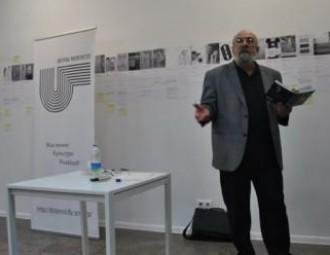Valiantsin Akudovich: Absence is the incredible potentiality

Valiantsin Akudovich’s public lecture “The metaphysics of the absence: how impossible becomes possible” from “Urbi et Orbi” lecture circuit coincided with the presentation of his book.
In the series of the “LogvinaŬ” publishing house Collegium Sarmaticum difficult books will appear, to read which requires intellectual work, noted the curator of the Collegium Sarmaticum Igar Babkou. And added: not only Belarusan literature, but Polish, Lithuanian, and Ukrainian as well; in short, “the Sarmatian wheel”.
“The Book about Non-existence” sums up Akudovich’s meditations on the concept of absence. It includes the previous works of the philosopher – an essay “I’m absent”, “To destroy Paris”, “A Farewell talk”. The central part consists of the essay “The Damnation of Parmenides”. Akudovich told about this thinker of antiquity below.
Valiantsin Akudovich didn’t agree upon being called an intellectual provoker. Here the author could not but quote his own book. He started from the very first sentence: “If I do resemble God in something, then only in the fact that we are both absent”. And explained: “I really think so, no provocation at all”.
The story about Absence goes way back in time, noted the lecturer. He reminded about the Big Bang Theory, as well as about the religious experience that considers Absence to be the predecessor of the world, because it is from Non-existence that God created everything.
Valiantsin Akudovich was speaking about the existential Non-existence in human, as well as about the great ontological Non-existence, which, cocoon like, wraps up everything in the world. He asked a question of Leibnitz, the pivotal problem in metaphysics of absence: why there exists something, not Non-existence?
In order to find out who and how developed the concept of Non-existence, Akudovich carried out a survey of the European discourse for the period of 2,5 thousand years. It is quite natural that he started from the ancient Greeks and singled out Parmenides among them, who claimed that there only exists what exists, and there is anything like “Non-existence.
According to Akudovich, Christianity is not interested in Non-existence: non-existence cannot be anywhere where God is present. He mentioned Hegel, who played with the thesis of existence and the antithesis of nonexistence. He noted that Heidegger in his lecture of 1929 has a revolutionary moment: he linked metaphysics and Non-existence (to think metaphysically means to think Non-existence). The work of Jean-Paul Sartre is connected with the concept of absence.
Akudovich believes that human rises from an animal only when he understands the concept of Non-existence. The importance of Non-existence for a human being is even explained on the book cover:
“First man lived by all that Exists (shall we call this period Eden), never knowing that besides Existence there is also Non-existence – his own one before everything. And when he realized that he was fully seized by metaphysical terror.
Meeting Non-existence was and remains the greatest event from all those happened with the human in his life. (…) But once an edge of Non-existence flashed before him, he left Eden, where all that is not human remains up until now.
“Human is the one who knows that Non-existence exists”.
Non-existence is always a denial. And absence is something that doesn’t exist and something that will never appear. Absence is the incredible potentiality. Everything comes from absence and, when disappearing, returns to absence, - Valiantsin Akudovich assumes.
The philosopher and methodologist Uladzimir Matskevich noticed that there exist symbols to define absence – at least hard and soft signs in the Russian language, and zero in mathematics.
Though for the Europeans Non-existence is something negative, not all the civilizations have a caution against Non-existence. Igar Babkou made an example of the Chinese, who are not only unafraid of Non-existence but also believe they are the sons of such a great non-existence as the sky. Non-existence can be positive in some way.




-
03.01
-
07.10
-
22.09
-
17.08
-
12.08
-
30.09



























